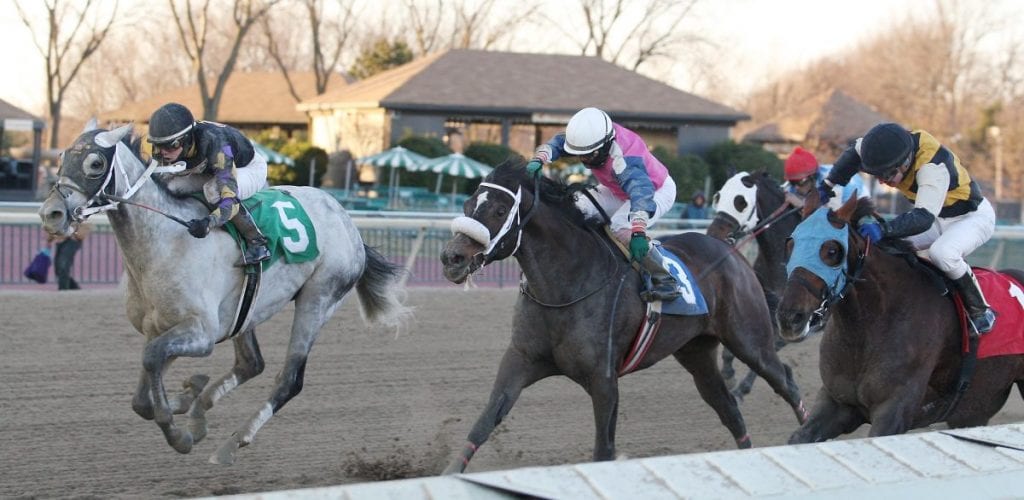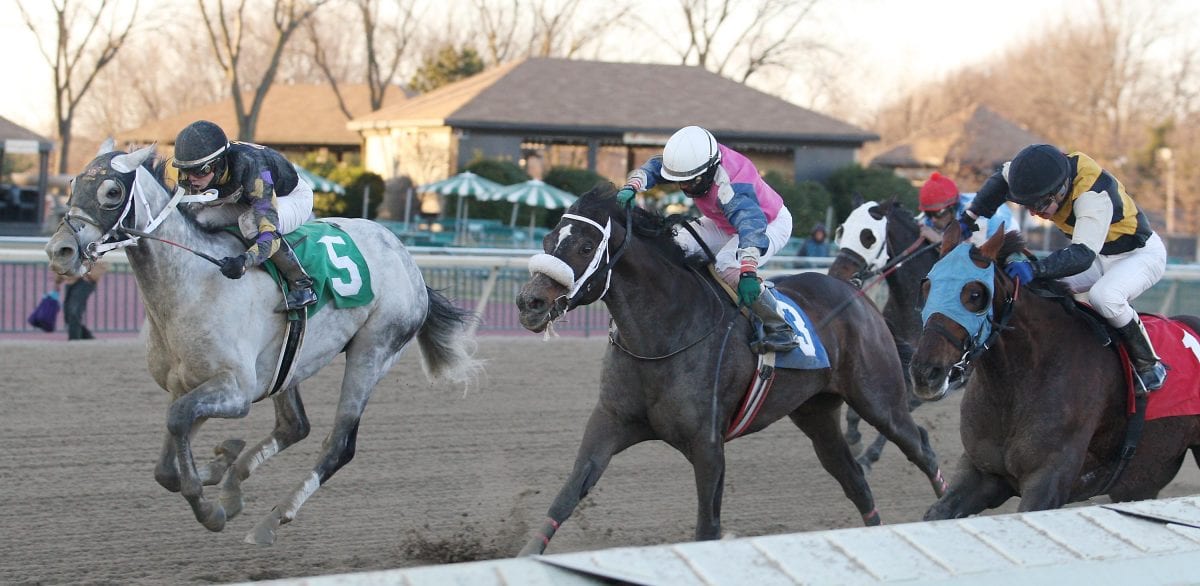
Racing at Parx and other Pennsylvania tracks was threatened by a legislative dispute now slogging towards resolution. Photo By Bill Denver/EQUI-PHOTO
by Linda Dougherty
In mid-October, Pennsylvania Gov. Tom Wolf (D) announced he was planning to shut down live horse racing by the end of the month if industry representatives and legislators couldn’t agree how to fund the insolvent State Racing Fund, in the wake of an ongoing state budget crisis and plummeting pari-mutuel tax revenue.
Wolf’s administration warned that, unless the horse industry shouldered the cost of drug testing, about $9 million annually, and Racing Commission expenses going forward, he would be forced to pull the plug on live racing.
Pennsylvania’s two racing commissions — one for Thoroughbred racing and one for standardbred — are funded by a tax on parimutuel wagers placed in Pennsylvania (though the races may occur anywhere). According to the state Department of Agriculture, there has been a 71 percent decline in wagers placed in the state on horse racing over the last 14 years, sliding from $1.46 billion in 2001 to $427.5 million last year, with a concomitant decreasein tax revenue. The decrease has left the state with $11 million in revenues to cover $20 million in expenses.
Lawmakers and horse industry representatives immediately launched into negotiations, and the likelihood of a total shutdown seemed remote with a resolution imminent as of Friday, when Wolf announced that he would defer a decision on shutting racing down.
“There have been ongoing discussions between the various stakeholders the last few weeks, and good progress has been made,” said Pete Peterson, spokesperson for the Pennsylvania Equine Coalition, a group made up of various standardbred and Thoroughbred factions. “I don’t foresee a shutdown of racing.”
The Pennsylvania Thoroughbred Horsemen’s Association, which represents Parx horsemen, stated in a short release that it “applauds the decision by the Governor to defer the suspension of racing.”
Among the concessions agreed to by the industry is that it would lease rather than purchase new laboratory testing equipment, cutting expenses by a third. The remaining $6.2 million that is needed has been the subject of further discussion.
Salvatore M. DeBunda, president of the Pennsylvania Thoroughbred Horsemen’s Association, said in a published report that he resented Wolf’s threat.
“There was no reason this could not have been resolved in a different way instead of these fire drill conditions,” he said.
Pennsylvania’s racing and breeding industries have been under fire from Harrisburg since 2010, when lawmakers first diverted money from the Race Horse Development Fund – created in 2004 by the legislation that legalized expanded gaming to help revitalize the industry and cover purses – to bolster the state’s General Fund. Since 2010, more than $185 million has been shifted to the General Fund, as well as $23 million to other programs, according to the Pennsylvania Gaming Control Board.
Also at issue this time around is Senate Bill 352, introduced by Sen. Elder Vogel (R-New Sewickley). The bill, which passed the Senate in June, proposes the dissolution of the separate state commissions currently under the Dept. of Agriculture in favor of a single oversight commission.
“It is time that Pennsylvania’s regulations are updated to keep pace with complex changes in the horse racing industry,” said Sen. Vogel. “My bill also makes a number of necessary changes to licensure, fines, fees and the pari-mutuel tax structure to properly fund regulatory oversight and drug testing.”
Peterson said that Senate Bill 352 is scheduled to be considered by the House Agricultural and Rural Affairs Committee on Wednesday.
On Friday, Dept. of Agriculture secretary Russell Redding released a statement that said, in part: “This week’s talks continued to produce positive steps forward. I appreciate the commitment by legislative leaders to schedule a committee vote in the House on Senate Bill 352. We continue to build on the framework agreement reached last week on that bill. No one is getting everything they want in this bill, but it will give us the long-term financial fix we need to maintain the integrity of this industry. We’ll keep working with the General Assembly in the coming days to put the finishing touches on the bill so a long-term solution can be enacted in the very near future.”
Because of the annual attack on the Race Horse Development Fund each year by Harrisburg, and fears that the money in the Pennsylvania breeding program will be sharply reduced, breeders have been looking to other states in which to drop their foals. The number of mares bred in Pennsylvania plummeted to 627 this year, down from 1,650 just five years ago, according to The Jockey Club.
“There’s no doubt that they will settle things one way or the other,” said Dr. William J. Solomon, who owns Pin Oak Lane Farm in New Freedom, Pa. “I think the money available to breeders is very safe.”








